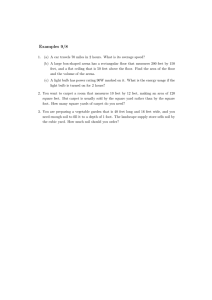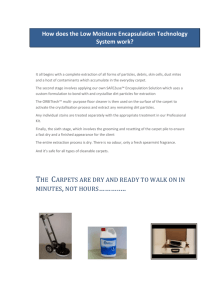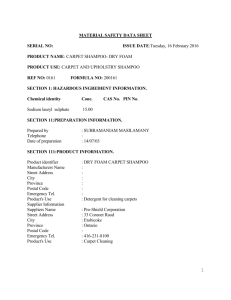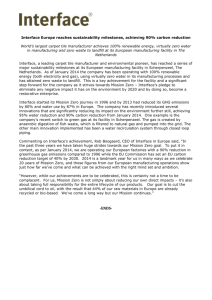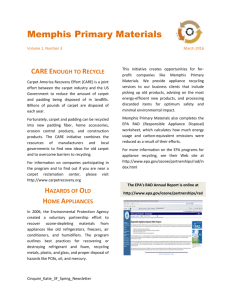Colorado School of Mines Campus Standards SECTION 09680
advertisement
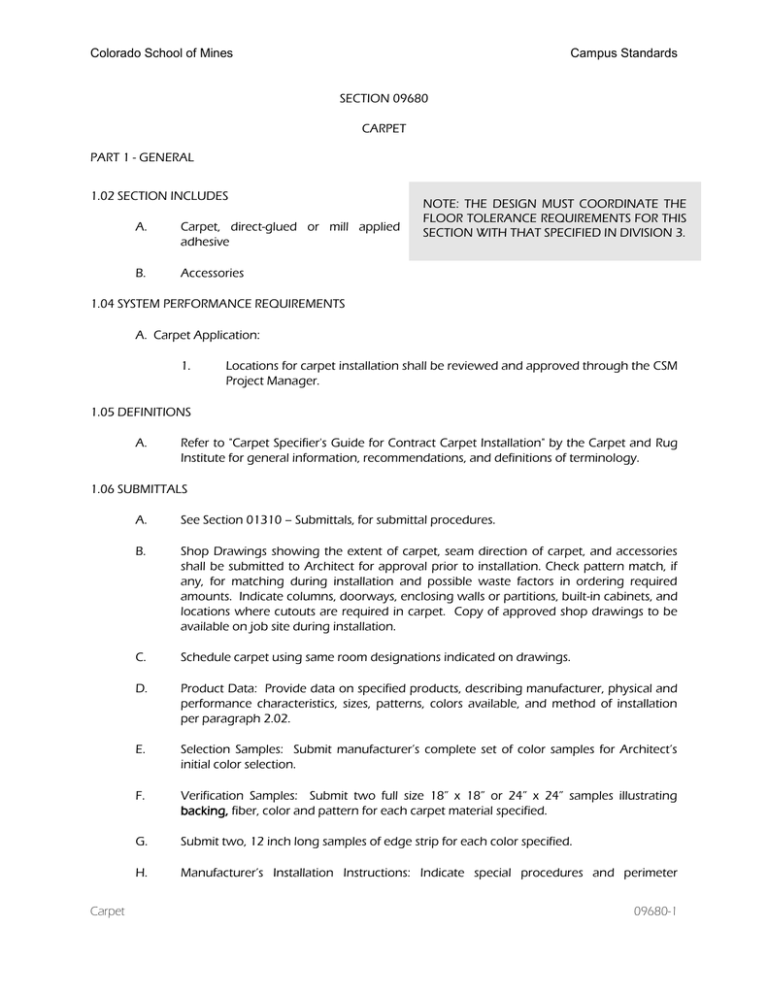
Colorado School of Mines Campus Standards SECTION 09680 CARPET PART 1 - GENERAL 1.02 SECTION INCLUDES A. Carpet, direct-glued or mill applied adhesive B. Accessories NOTE: THE DESIGN MUST COORDINATE THE FLOOR TOLERANCE REQUIREMENTS FOR THIS SECTION WITH THAT SPECIFIED IN DIVISION 3. 1.04 SYSTEM PERFORMANCE REQUIREMENTS A. Carpet Application: 1. Locations for carpet installation shall be reviewed and approved through the CSM Project Manager. 1.05 DEFINITIONS A. Refer to "Carpet Specifier's Guide for Contract Carpet Installation" by the Carpet and Rug Institute for general information, recommendations, and definitions of terminology. 1.06 SUBMITTALS Carpet A. See Section 01310 – Submittals, for submittal procedures. B. Shop Drawings showing the extent of carpet, seam direction of carpet, and accessories shall be submitted to Architect for approval prior to installation. Check pattern match, if any, for matching during installation and possible waste factors in ordering required amounts. Indicate columns, doorways, enclosing walls or partitions, built-in cabinets, and locations where cutouts are required in carpet. Copy of approved shop drawings to be available on job site during installation. C. Schedule carpet using same room designations indicated on drawings. D. Product Data: Provide data on specified products, describing manufacturer, physical and performance characteristics, sizes, patterns, colors available, and method of installation per paragraph 2.02. E. Selection Samples: Submit manufacturer’s complete set of color samples for Architect’s initial color selection. F. Verification Samples: Submit two full size 18” x 18” or 24” x 24” samples illustrating backing, fiber, color and pattern for each carpet material specified. G. Submit two, 12 inch long samples of edge strip for each color specified. H. Manufacturer’s Installation Instructions: Indicate special procedures and perimeter 09680-1 Colorado School of Mines Campus Standards conditions requiring special attention. I. Maintenance Data: Include maintenance procedures, recommendations for maintenance materials and equipment, and suggested schedule for cleaning. J. Manufacturer’s Carpet Warranty. K. Floor testing results required under 1.09B. 1.07 QUALITY ASSURANCE A. B. Manufacturer Qualifications 1. Upon request, manufacturer to provide representative to assist in project start-up and to inspect installation weekly while in process and upon completion. 2. Company specializing in manufacturing specified carpet with minimum 5 years documented experience 3. Representative will notify designated contact if any installation instructions are not followed. 4. Single Source Responsibility: Obtain all types of carpet from one source and by a single manufacturer. 5. Manufacturer’s representative shall be present at 6 month and 11 month warranty review walkthroughs. Installer Qualifications 1. Flooring contractor must be acceptable/certified by the carpet manufacturer prior to award. 2. Flooring contractor to be a specialty contractor normally engaged in this type of work and shall have prior experience in the installation of these types of materials. Installer shall be a company specializing in installing specified carpet with minimum 1 year documented experience 3. Flooring contractor will be responsible for proper product installation as specified by the carpet manufacturer and JOB CONDITIONS herein, including floor testing and preparation. 4. Flooring contractor to provide Owner a written installation warranty that guarantees the completed installation to be free from defects in materials and workmanship for a period of one year after Substantial Completion 1.08 DELIVERY, STORAGE, AND HANDLING A. Carpet Deliver materials to the site in manufacturer’s original packaging listing manufacturer’s name, product name, identification number, and related information. 09680-2 Colorado School of Mines Campus Standards B. Store in a dry location, between 60 degrees F and 80 degrees F and a relative humidity below 65%. Protect from damage and soiling. Stack carpet rolls horizontally on a flat surface, stacked no higher than two rolls. C. Make stored materials available for inspection by the Owner’s representative. D. Store materials in area of installation for minimum period of 48 hours prior to installation. 1.09 PROJECT CONDITIONS A. Sub-floor preparation is to include all required work to prepare the existing floor for installation of the product as specified in this document and Manufacturer’s installation instructions. B. The maximum amount of moisture evacuation from the floor is 3.0 pounds per 1,000 square feet in 24 hours. The acceptable pH level of the substrate is between 7.0 and 9.0. Flooring contractor is responsible for floor testing. C. All material used in sub-floor preparation and repair shall be recommended by the carpet manufacturer and shall be chemically and physically compatible with the carpet system being bid. D. Maintain minimum 65 degrees F ambient temperature and 65% Relative Humidity for 72 hours prior to, during, and 48 hours after installation. E. Do not install carpet until space is enclosed and weatherproof, wet-work in space is completed and nominally dry, work above ceilings is complete, and ambient temperature and humidity conditions are and will be continuously maintained at values near those indicated for final occupancy. 1.10 EXTRA MATERIALS A. Deliver usable scraps of carpet and extra carpet tiles to storage space designated by Owner, properly packaged and identified. Usable scraps are defined to include roll ends of less than 9'-0" length, and pieces with minimum dimension of 3'-0". Dispose of smaller pieces. 1.11 WARRANTY Carpet A. Warranty to be sole source responsibility of the Manufacturer. Second source warranties and warranties that involve parties other than the carpet manufacturer are unacceptable. B. If the product fails to perform as warranted when properly installed and maintained, the affected area shall be either repaired or replaced at the discretion of the Manufacturer. C. Warranty shall be for a specifically defined non-prorated period of not less than twenty years. D. The non-prorated twenty-year warranty shall cover against and specifically define the following: 09680-3 Colorado School of Mines Campus Standards 1. Excessive Surface Wear: More than 15% loss of pile fiber weight 2. Excessive Static Electricity: More than 3.0 kV per AATCC 134 3. Delamination 4. Edge Ravel 5. Zippering PART 2 – PRODUCTS 2.01 MANUFACTURERS A. Approved Carpet Manufacturers, subject to Owner approval: 1. Bentley Mills 2. Tandus Flooring 2. Mannington Commercial 3. Interface, Inc. 2.02 MATERIALS, GENERAL A. B. 1 Carpet 1 Broadloom carpeting 1. Construction: Tufted textured loop. 2. Minimum Gauge: 1/10 inch. 3. Average Pile Density: 5000 oz per cubic yard per CRI Density Formula1 4. Basis of Design pattern inserted here. All alternates must be officially approved seven days prior to bid date. 5. Provide chemically welded and air tight seam impermeable to moisture and airflow. 6. Minimum 6’ width roll goods. Carpet 2 Characteristics: Modular Carpeting 1. Construction: Tufted textured loop. 2. Minimum Gauge: 1/10 inch. 3. Average Pile Density: 5000 oz per Cubic yard per CRI Density Formula 4. Basis of Design pattern inserted here. All alternates must be officially approved CRI Density Formula= (36 in/yd X Face Weight oz/SY)/Pile Thickness (inches) Carpet 09680-4 Colorado School of Mines Campus Standards seven days prior to bid date. 5. C. D. E. Carpet Modular carpet tiles may be 24” x 24” or 18” x 18” Fiber Characteristics 1. Nylon Fiber: Bulked Continuous Filament (BCF) Type 6,6 Nylon by Invista or Solutia. Solution Dyed or Solution and Yarn Dyed. 2. Apply durable stain inhibitor to the fiber during product manufacturing to resist fiber staining and soiling. (Minimum average of three fluorine analyses of a single composite sample per CRI TM-102: 500 ppm.) 3. Fiber to contain carbon-core filament for permanent static control (AATCC 20: Cross Section with Photo, Report on Determination of Antistat Existence). Topical treatments not allowed. Backing Characteristics 1. Primary Backing: Synthetic Woven or Non-Woven. 2. Pre-Coat (Fusion Coat): Sealant Vinyl 3. Secondary Backing: Closed-Cell, vinyl backing system. a. Impermeable to moisture and airflow. b. Provide for a chemically welded and water-tight seam impermeable to moisture and airflow for broadloom carpets. N/A for Modular. c. Minimum 6’ roll goods. Modular 24” x 24” or 18” x 18” d. At Contractor’s discretion, product may be installed with a mill-applied releasable “dry” adhesive system if available from Manufacturer. Performance Characteristics 1. Test reports for performance assurance testing listed under the following paragraph to be submitted upon request. Submitted results shall represent average results for production goods of the referenced style. 2. Requirements listed below must be met by all products. a. Flooring Radiant Panel ASTM E-648 / NFPA 253: Class 1 (CRF: 0.45 watts/sq cm or greater) b. Federal Flammability: CPSC FF 1-70: Passes c. Smoke Density: ASTM E-662 / NFPA 258: < 450 Flaming Mode d. Electrostatic Propensity: AATCC 134 (Step & Scuff): 3.0 kV or less 09680-5 Colorado School of Mines F. Campus Standards e. Static Coefficient of Friction: ASTM C-1028: Passes ADA Guidelines for Accessible Routes (Minimum 0.60) f. Delamination of Secondary Backing of Pile Floor Coverings: ASTM D3936: Minimum 15 lbs. g. Lightfastness: AATCC 16E: > 4 @ 100 hours h. Vetterman Drum: ASTM D-5417: Minimum 3 @ 22,000 cycles i. Moisture Barrier: Moisture Penetration by Impact @ 10 psi: No Penetration of backing and seam after 10,000 impacts j. Air Flow Barrier: Air Permeability of Textile Fabrics: No Air Flow (0.0 ft3/min) through backing and seam – seam applies only to roll products k. Seam Integrity: Seam to remain intact after 50,000 cycles per Phillips Chair Test – roll products only l. VOC Chamber Testing: ASTM D-5116: Product inclusive of “dry” adhesive system (at Contractor’s discretion) meets criteria established by the State of Washington Indoor Air Quality Specification for Carpet and/or Carpet & Rug Institute’s (CRI) Indoor Air Quality Carpet Testing Program. If “wet adhesive” is used to install the product, carpet and adhesive to meet CRI’s Green Label requirements Substitutes/Alternates 1. Subject to compliance with all requirements, “or equal” must be similar in selected color(s) and aesthetic appearance, meet the specified average pile density and backing system. Substitution sample and submittals to be considered must be submitted for written approval of quality and color in accordance with bidding documents. Sample of proposed substitute must include both the face and proposed backing (color-only sample not acceptable). 2.03 ACCESSORIES Carpet A. Materials recommended by Manufacturer for patching, priming, chemically welding the seams, and other required accessories. B. Adhesives: For Modular - Releasable type. At contractor’s discretion, supply carpet with a pre-cured, “dry” adhesive system or install with full spread adhesive, extremely low VOC in compliance with CRI Indoor Air Quality Adhesive Testing Program requirements and compatible with materials being adhered, as recommended by the Manufacturer. For Roll products follow all instructions per manufacturer and use manufacturers adhesives, seam sealers and seam cleaners. C. Sub-Floor Filler: Type recommended by carpet manufacturer. D. Moldings and Edge Strips: Rubber, color as selected by Architect. E. Seam Adhesive: Recommended by manufacturer. 09680-6 Colorado School of Mines F. Campus Standards Contact Adhesive: Recommended by carpet manufacturer; releasable type. PART 3 – EXECUTION 3.01 EXAMINATION A. Verify that sub-floor surfaces are smooth and flat within tolerances specified in Section 03300 and are ready to receive carpet. B. Verify that sub-floor surfaces are dust-free, and free of substances which would impair bonding of adhesives to sub floor surfaces. C. Verify that concrete surfaces are ready for installation by conducting moisture and pH testing. Results must be within limits recommended by Manufacturer. 3.02 PREPARATION A. Prepare sub-floor to comply with criteria established in Manufacturer’s installation instructions. Use only preparation materials that are acceptable to the Manufacturer. B. Remove all deleterious substances from substrate(s) that would interfere with or be harmful to the installation. (i.e. floor wax) C. Remove sub-floor ridges and bumps. Fill cracks, joints, holes, and other defects. D. There will be no exceptions to the provisions stated in the Manufacturer’s installation instructions. 3.03 INSTALLATION, GENERAL Carpet A. Install product in accordance with Manufacturer’s installation instructions. B. Verify carpet match before cutting to ensure minimal variation between dye lots. C. Layout carpet and locate seams in accordance with shop drawings. 1. Locate seams in area of least traffic, out of areas of pivoting traffic, and parallel to main traffic. Minimize cross seams. 2. Do not locate seams perpendicular through door openings. 3. Align run of pile in same direction as anticipated traffic and in same direction on adjacent pieces. 4. Locate change of color or pattern between rooms under door centerline. 5. Provide monolithic color, pattern, and texture match within any one area. D. Install carpet tight and flat on sub-floor, well-fastened at edges, with a uniform appearance. E. Double-cut carpet seams with accurate pattern match. Make cuts true, and unfrayed. 09680-7 Colorado School of Mines Campus Standards Use a glass cutter in lieu of double cutting at manufacturer’s recommendation. F. Chemically weld all seams with manufacturer’s recommended seam sealer as stated in installation instructions. Make sure the seam is fully sealed. Use seam cleaner to ensure no sealer is left on fiber at the seam. (Not applicable to non-vinyl broadlooms and carpet tile.) G. Trim carpet neatly at walls and around interruptions. H. Where demountable partitions or other items are indicated for installation on top of finished carpet tile floor, install carpet tile before installation of these items. I. Cut and fit carpet/carpet tile to butt tightly to vertical surfaces, permanent fixtures, and built-in furniture including cabinets, pipes, outlets, edgings, thresholds, and nosings. J. Extend carpet/carpet tile into toe spaces, door reveals, closets, open-bottomed obstructions, removable flanges, alcoves, and similar openings. K. Maintain reference markers, holes, and openings that are in place or marked for future cutting by repeating on finish flooring as marked on subfloor. Use nonpermanent, nonstaining marking device. L. Install pattern parallel to walls and borders to comply with CRI 104, Section 15, "Patterned Carpet Installations" and with carpet manufacturer's written recommendations. M. Roll with appropriate roller for complete contact of carpet with adhesive to sub-floor. Carpet to be securely adhered in accordance with ADA requirements (Section 4.5.3). N. Completed carpet is to be smooth and free of bubbles, puckers, and other defects. 3.04 DIRECT-GLUED CARPET Carpet A. At Contractor’s discretion, use “wet” adhesive to direct glue carpet to substrate in lieu of mill-applied or other “dry” adhesive. B. Double cut carpet seams, with accurate pattern match. Make cuts straight, true, and unfrayed. Apply seam adhesive to cut edges of woven carpet immediately. C. Apply contact adhesive to floor uniformly at rate recommended by manufacturer. After sufficient open time, press carpet into adhesive. D. Apply seam adhesive to the base of the edge glued down. Lay adjoining piece with seam straight, not overlapped or peaked, and free of gaps. E. Roll with appropriate roller for complete contact of adhesive to carpet backing. F. Complete installation of edge strips, concealing exposed edges. Bind cut edges where not concealed by edge strips. 09680-8 Colorado School of Mines Campus Standards 3.05 TESTING, CLEANING, AND CERTIFICATION A. Remove all rubbish, wrappings, debris, trimmings from site and dispose of properly. B. Perform the following operations immediately after installing carpet: 1. Remove excess adhesive, seam sealer, and other surface blemishes using cleaner recommended by carpet manufacturer. 2. Remove yarns that protrude from carpet surface. 3. Vacuum carpet using commercial machine with face-beater element. C. Protect installed carpet to comply with CRI 104, Section 16, "Protection of Indoor Installations." D. Protect carpet against damage from construction operations and placement of equipment and fixtures during the remainder of construction period. Use protection methods indicated or recommended in writing by carpet manufacturer and carpet adhesive manufacturer. END OF SECTION Carpet 09680-9
